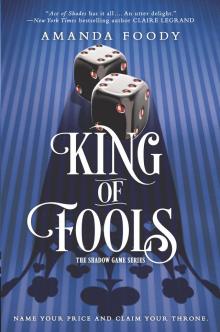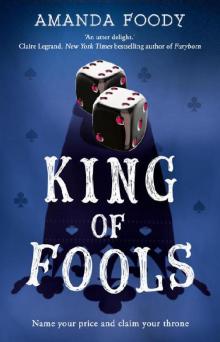- Home
- Amanda Foody
Ace of Shades Page 2
Ace of Shades Read online
Page 2
“Who’s Lourdes Alfero to you?” Shark’s fingers twitched as he reached for something at his side. A gun.
“No one,” Enne said hurriedly, doing her best not to stutter. Never let anyone see your fear. Another one of Lourdes’s rules—one Enne was certainly breaking. Her chest tightened as Cigar stepped closer, close enough to grab her. “My apologies. I believe there’s been a mistake. Thank you very much for your time.”
Enne dragged her trunk back into the crowd before they could stop her. Her mind raced as she attempted to conjure some sort of explanation for the officers’ reactions. Surely, they must’ve confused her mother’s name with someone else’s.
An uneasiness settled into her stomach—maybe there’d been no mistake. She was in the center of the harbor landing, but all around her were locked doors, locked doors.
Someone tapped Enne’s shoulder. She shrieked and whipped around.
“Scare much?” The boy smirked.
“You know, it’s rude to startle people, and—” And she needed to get out of here.
“Look over my shoulder.” He leaned down like he was whispering in her ear, allowing her to see beyond him.
The two police officers pushed through the crowd in their direction. Enne’s hands began to sweat inside her lace gloves.
“Who are you?” he asked. “First you’re looking for Levi Glaisyer, and now you got the whiteboots tailing you.”
“You know Mr. Glaisyer?” How could a boy like this know a gentleman? He smelled like he slept in a sewer, and there was something about his face that unnerved her—not so much his crooked frown as his crooked smile. He looked like a warning from her guidebook.
He rolled up his left sleeve to reveal a black tattoo of a club on the underside of his arm, like the card suit. It was small, halfway between his wrist and elbow. “I’m an Iron.”
“I’m afraid I’m not familiar with...the terminology.” Though, even as she said it, Enne realized it did sound familiar. Something she had read in the section about the North Side. Admittedly, she’d skipped most of those parts. The North Side’s reputation was so dirty, even its chapters in her guidebook looked a little bit stained.
The boy leaned down a second time. The whiteboots watched them from the end of the block, and Shark kept one hand on his gun. “You’re lost, missy. And walking straight into some muck. So take my advice: ditch your trunk, and scram. Playing nice is the same as losing in this city.” Before she could adequately digest what he’d said, he whispered, “Three, two, one.”
He took off.
Behind her, Shark and Cigar shoved their way toward her, cursing and knocking travelers aside. Enne whimpered, terrified, yet loath to abandon all her possessions.
But the decision took only a moment. She was lost, and the boy knew Mr. Glaisyer, Enne’s only connection to finding Lourdes. Maybe Mr. Glaisyer could explain the misunderstanding between the whiteboots and her mother. Maybe he possessed the key to those locked doors. And besides, possessions could be replaced.
She dropped her trunk, yanked up the hem of her skirt, and sprinted after the boy.
He ran two blocks past the end of the harbor before turning down an alley. Wheezing, she forced her legs to move faster. Her heels clicked loudly with each step, and sweat dampened her forehead and undersleeves. Enne couldn’t remember the last time she’d run. This behavior must’ve breached every one of Lourdes’s rules.
The boy slipped down another alley up ahead, while Enne trailed fifty paces behind. What if she lost him? For every step she made, he’d already made three. He clearly had some sort of speed talent, which explained why his features were so angular—like he’d been made to be aerodynamic. She passed a pawnshop and an outdoor grocer, but no one looked twice at her, as if a girl fleeing from the authorities was a common morning occurrence in New Reynes. Maybe it was.
The next alley had no streetlights, and thanks to the black clouds and towering buildings, she could hardly see where her feet landed. Soon the noises of the main street—the motorcars, the shouting, the traffic whistles—disappeared, and it became eerily quiet. Only their footsteps remained. Enne’s heart pounded so hard, she felt the beats in her back.
The buildings here looked different, too. In the harbor, the shipping houses were made of a weathered white stone—the kind her guidebook described as characteristic of the city. But the architecture around her now was gothic and black, full of spires and archways and wrought iron. Everything was sharp, a place designed to cut. To draw blood. It was the kind of dark where shadows didn’t exist. Wherever she was...she shouldn’t be here.
She turned a corner and found the boy waiting for her. He stood at the doorway of a house with boarded windows and shriveled ivy crawling up its gutters. He grabbed her by her blazer and jerked her inside. She crashed to the wooden floor.
They were in a dusty, unused kitchen. Two panels on the ceiling flickered with murky light.
The boy bent over her. “So, why are you looking for Pup?”
Enne scrambled to her feet and smoothed out her dress, hyperaware of how inappropriate their situation was. They were alone in goodness knows where. She didn’t know his name. She didn’t even know what he wanted.
What had she done?
No emotions, no fear, she thought. She smiled and adjusted her posture, but that couldn’t have made much of an impression, panting and sweating as she was.
“Well, I’m actually looking for my mother, Lourdes Alfero,” Enne explained. “She mentioned Mr. Glaisyer to me in a letter. She said he’d be glad to help.”
“I never knew Pup to be glad to help anyone,” he said darkly. “Sure you got the right man?”
Dread blossomed in her like black ink soaking through paper. Could there have been some other mistake? “I believe so,” she replied meekly. “How are you acquainted with him?”
“Acquainted?” he echoed. With his thick New Reynes accent, he didn’t pronounce the t. It reminded Enne that she was awfully far away from home.
“How do you know Mr. Glaisyer?” she asked.
“Everyone does,” he answered. “He’s the lord.”
Footsteps thudded down a staircase, and two others entered the kitchen. The first was another boy, also about Enne’s age. He had a soldier’s look to him: broad shoulders, a shirt too tight for his muscular build and an expression like he was never much surprised about anything—that, or he didn’t care. Black-and-white tattoos covered his arms, some disappearing into his sleeve, snaking up his neck. Among them were two small ones, the only ones with color: a red J on one arm, and a diamond on the next, in the same places as the first boy’s. He wore his trousers cuffed and his blond hair slicked back underneath a newsboy cap.
Like a gangster, she thought. She took a step closer to the door.
The other person was a girl, maybe thirteen years old. She had golden skin and thick black hair, which was cut bobbed and jagged. She wore men’s clothes that were several sizes too large and a pair of ruby earrings that Enne imagined she’d stolen. On the underside of her forearms, just like the boys, she had two tattoos: a black spade on the left, a five on the right.
The boys met each other’s eyes sternly. “Where’ve you been, Chez?” the soldier one demanded. “And where—” his eyes wandered over to Enne “—did you find a missy like this?”
“Near Tropps Street. She was wandering around...an easy target, really—”
“You’re a bad liar,” the soldier one said. “You’ve been pickpocketing near the harbor again. You know Levi has business with the whiteboot captain. Business worth a lot more than a few volts in some tourist’s pocket.”
Enne perked up at the mention of Levi. So they both knew him.
“Then where’s my paycheck, Jac?” Chez growled. “Where’s her paycheck?” He gestured toward the girl. When the soldier boy—Jac—didn’t respond, Chez added, “I found th
is missy asking the whiteboots about Pup—I mean, about Levi. Levi and some other person. Then they started tailing her.” Chez took a switchblade out of his pocket and flipped it between his knuckles—deftly, expertly. Enne’s mouth dried, and she hugged her purse to her side. “She’s kinda thick.”
Jac tugged at his cap and nodded at Enne, who tried not to appear nervous. From his build, Enne guessed he had a strength talent. If he grabbed her, she wouldn’t be able to escape. And if she ran, Chez would catch her.
They all knew Levi Glaisyer, but something was wrong. Without knowing why, she felt trapped. Fifty minutes in the city, and she’d already made a dangerous mistake.
Jac stepped closer to Enne and stared at her with such intensity that, if not for years of etiquette training, would’ve made her drop her gaze to the floor. Lost or not, strength and speed talents or not, she refused to let them know they intimidated her.
“What’s your name?” he asked, arms crossed.
“Enne,” she said, clearly, loudly, as if answering roll call rather than speaking to a potential delinquent.
Don’t speak about yourself unless asked. Never show fear. Never allow yourself to be lost. No emotions. Don’t trust anyone unless you must.
Lourdes had drilled dozens of rules into Enne in the hope that they would become second nature. Usually, they were. Sometimes Enne could hear her mother’s voice in her head, whispering about etiquette and precautions. But right now, all she could focus on was Chez’s knife twirling around his index finger and the seriousness in Jac’s gray eyes. Even the girl looked threatening, and she was younger than Enne.
Enne held her breath, but even so, she felt herself cracking...shattering.
“Enne? That’s a letter, ain’t it?” Jac asked.
“Yes.” She didn’t hide her astonishment well, but the boy didn’t seem to notice.
“You from around here?”
“I’m from Bellamy.”
“Quite a journey.” He smiled, and she relaxed a bit when she noticed his dimples and the way his ears stuck out. “When did you get here?”
“An hour ago.” A wave of nausea crashed over her when she remembered that she’d left her trunk with all her belongings near the harbor. Someone would’ve stolen them since then. Now her only means of paying for her stay in New Reynes and her ticket home were the thousand volts she was carrying, meant to last an entire summer. She hadn’t anticipated buying new clothes or other necessities while in the city.
She was lost, surrounded by strangers, and all she had were the contents of her purse. And it was—mostly—her own fault.
When she caught Chez and the girl both staring hungrily at her bag, she hugged it closer.
Fear. Lost. Emotions. Trusting... Were there rules for when she was breaking every rule?
“I don’t know why you wanna see Levi,” Jac said, shaking her trembling hand, “but anyone who outruns two whiteboots on their first day here seems trustworthy in my book.”
Even if he trusted her, Enne knew better than to trust him. She knew better than to trust anyone in New Reynes. Except, hopefully, this Levi Glaisyer.
“Levi will be here in an hour,” he said, and those were the only words that held her together. “He’s busy, and I can’t make promises, but I’ll make sure he talks to you.” He took her arm and led her to the sitting room, his smile a little too wide, his grip a little too tight. “I’m Jac Mardlin. Allow me to be your official welcome to the City of Sin.”
LEVI
Muck. Of all the gambling taverns in the city, why had the whiteboot captain chosen Grady’s? Levi Glaisyer hadn’t set foot in there since he’d handed Grady his resignation four years ago. He paced back and forth in the alley outside the tavern, dropping the copy of The Crimes & the Times he’d been carrying. On the front page, a photograph of Malcolm Semper, the oh-so-respected Chancellor of the Republic, soaked up the muddy rainwater.
After a few more moments of cursing, Levi gathered his nerve, straightened his felt homburg hat and strode to the door.
The inside of the tavern hadn’t changed at all. It still reeked of tobacco and burnt food, and the patrons were loud, even now, early in the morning. A group of men seated at the main card table—what was once Levi’s card table—were dressed in clothes with more patches than original fabric. A woman in fishnet stockings giggled and toppled into one of their laps.
The dealer at the table did a double take once he noticed Levi. Most gamblers considered Levi to be the best dealer in the city, and he didn’t normally show his face in establishments as small-time as this one.
But he hadn’t come to gamble. He’d come for business.
Levi searched the room for Jamison Hector, the captain of the city’s whiteboots. The two of them were supposed to meet here at ten o’clock sharp, and Levi had been on edge about it for days. He wasn’t usually the sort to rendezvous with authority—if only on principle—but lately, Levi had done a lot of things he’d never thought he would.
He locked eyes with the captain at a table in the back corner but made it only halfway to him before Grady slapped his shoulder, hard enough for him to wince.
“Levi, never thought I’d see you again,” Grady said with a laugh. His enormous gut tremored. “How you doing?”
As if Grady didn’t know how Levi was doing, what he’d become since his stint here as an amateur card dealer. Reputation aside, he was easily recognizable with his dark brown skin, his calculating gaze and his signature coarse curls—bronze at the roots, but black at the ends, like a burnt-out match. Levi had a look like he was trying to sell you something, and a smile that made you want to buy it.
“I’ve been busy,” Levi answered. “How’s business?”
“Just hired another new dealer and had some rotten luck. He barely makes ten percent profit. Ten percent.”
Levi whistled with feigned concern.
“It was better when you were dealing for me. No, don’t bother apologizing. St. Morse must shell out three times what I paid you. At least.”
Try ten times, Levi thought. But that doesn’t come without strings attached.
“I could get you an Iron,” Levi offered, always the businessman. He made a show of adjusting his sleeves to brandish his tattoos: the ace on one arm, the spade on the other. They marked him as the Iron Lord. “I found this new kid who deals pretty well—”
“I would, but I can’t. The whiteboots keep paying me visits lately, and I don’t want any trouble.” Before Levi could point out that technically speaking, the Irons were the only gang that didn’t break the law, Grady continued, “They think I’m smuggling.”
“Aren’t you?”
“Of course.” He laughed again. “I’ll get you a drink, on the house. Anything for my best dealer—and youngest, I might add. A Snake Eyes—that still your favorite?”
“Sure is,” Levi said politely, though he’d never had a taste for the drink. It was also barely ten in the morning. “Thanks.”
“You should stop by more often. Teach the new fellow how it’s done.”
“Maybe I will,” Levi lied. He had no intention of revealing his tricks to anyone, especially a no-name dealer who wasn’t an Iron.
When Grady walked away, Levi approached the whiteboot captain. The captain wasn’t dressed in his usual uniform, but Levi never forgot a face—and the captain had an interesting one. His nose had been broken so many times that it was bent decidedly to the left, and an ugly scar traced across his jawline to the place where his right ear had once been.
“Not every day I have a drink with the Iron Lord,” the captain said. He had a grandfatherly voice—all condescension, but with an added hint of malice. He looked Levi over more closely. “But you must be barely old enough to drink. Isn’t that right?”
Levi tilted his head to the side and cracked his neck, a nervous habit of his. He hated the way people
talked to him in this city—like he was nothing. No, like he was worse than nothing. Like he was a joke.
Levi reached into his pocket and pulled out a silk pouch filled with seven orbs. He set it on the table in front of the captain.
The man raised his eyebrows and opened it. He pulled out the first orb. It was a clear glass sphere, about the size of a billiard ball. White sparks, called volts, sizzled within the glass.
The captain held it up to the lamplight and examined it. “This is good quality.”
“Only the best for my clients,” Levi said smoothly.
“You make it?”
“No. I’m not in the orb-making business.” Not anymore.
“Yes, we’re all aware what kind of business you’re in,” the captain said drily. He pulled out a mechanical volt reader, flipped open the orb’s metal cap and slipped the antenna inside. The meter read 180 volts. He did this with the other six orbs, even though it was widely known that Levi would never cheat a client. They were all there. Every volt he owed him.
Dealing in orbs was a very official way of doing business—it made Levi look more legitimate. As a currency, volts could be traded in two ways. Glass orbs, like the ones Levi had given the captain, were the traditional method. Alternatively, you could carry volts in your skin. This was the hardest to track, the most difficult to steal and the favorite method of the city’s gangsters.
The captain slipped the last orb into the pouch. “It’s a pity. The Glaisyer orb-making talent is the best of them all.” He shook his head. “I don’t want to know how you got these.”
Levi’s eyebrows furrowed. “The investment was a success. You’re lucky you paid in when you did. The venture—”
“Was a scam, boy. Don’t lie to me.”
Levi’s sense of alarm never crossed his expression—he had too skilled a poker face for that. But what exactly was the old man suggesting? He couldn’t know. That wasn’t possible.

 King of Fools
King of Fools Ace of Shades (The Shadow Game Series)
Ace of Shades (The Shadow Game Series) King Of Fools (The Shadow Game series, Book 2)
King Of Fools (The Shadow Game series, Book 2) Ace of Shades_The Shadow Game Series
Ace of Shades_The Shadow Game Series Daughter of the Burning City
Daughter of the Burning City